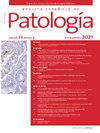Synchronous adenocarcinoma of the endometrium and colon in a woman with Lynch syndrome associated with a mutation of the MSH6 gene
IF 0.5
Q4 Medicine
引用次数: 0
Abstract
Introduction
Lynch syndrome (LS) is an autosomal dominant genetic condition, accounting for an estimated prevalence of 2–3% of the causes of hereditary colorectal carcinoma. In addition, it increases the risk of endometrial and ovarian cancer, among others.
Case report
A 56-year-old woman with a 6-month history of pelvic pain, dyspareunia and hypermenorrhoea. Family history: her mother died of endometrial cancer at the age of 71, and her younger brother died of gastric cancer at the age of 61. A transvaginal ultrasound revealed a 20 mm thickening of the endometrium, and the biopsy showed a FIGO 2 endometrioid carcinoma. Abdominal MRI demonstrated diffuse thickening of the rectum, while colonoscopy revealed an infiltrative, ulcerated tumour lesion in the sigmoid colon and a lesion in the rectum, consistent with invasive adenocarcinoma of the colon and adenoma with high-grade dysplasia in the rectal biopsy. Simultaneous surgical resection was indicated. A molecular panel confirmed a mutation in the MSH6 gene, confirming Lynch syndrome.
Conclusions
A rare case of Lynch syndrome associated with an MSH6 gene mutation, diagnosed with synchronous endometrial carcinoma and adenocarcinoma of the sigmoid colon.
Lynch综合征女性与MSH6基因突变相关的子宫内膜和结肠同步腺癌
lynch综合征(LS)是一种常染色体显性遗传病,估计占遗传性结直肠癌病因的2-3%。此外,它还会增加患子宫内膜癌和卵巢癌等疾病的风险。病例报告一名56岁女性,骨盆疼痛、性交困难和痛经6个月。家族史:母亲71岁死于子宫内膜癌,弟弟61岁死于胃癌。经阴道超声显示子宫内膜增厚20mm,活检显示FIGO 2子宫内膜样癌。腹部MRI显示直肠弥漫性增厚,结肠镜检查显示乙状结肠浸润性溃疡性肿瘤病变和直肠病变,与直肠活检中结肠浸润性腺癌和高级别不典型增生腺瘤一致。同时手术切除。一个分子小组证实了MSH6基因的突变,证实了林奇综合征。结论一例罕见的Lynch综合征合并MSH6基因突变,诊断为乙状结肠同步子宫内膜癌和腺癌。
本文章由计算机程序翻译,如有差异,请以英文原文为准。
求助全文
约1分钟内获得全文
求助全文
来源期刊

Revista Espanola de Patologia
Medicine-Pathology and Forensic Medicine
CiteScore
0.90
自引率
0.00%
发文量
53
审稿时长
34 days
 求助内容:
求助内容: 应助结果提醒方式:
应助结果提醒方式:


